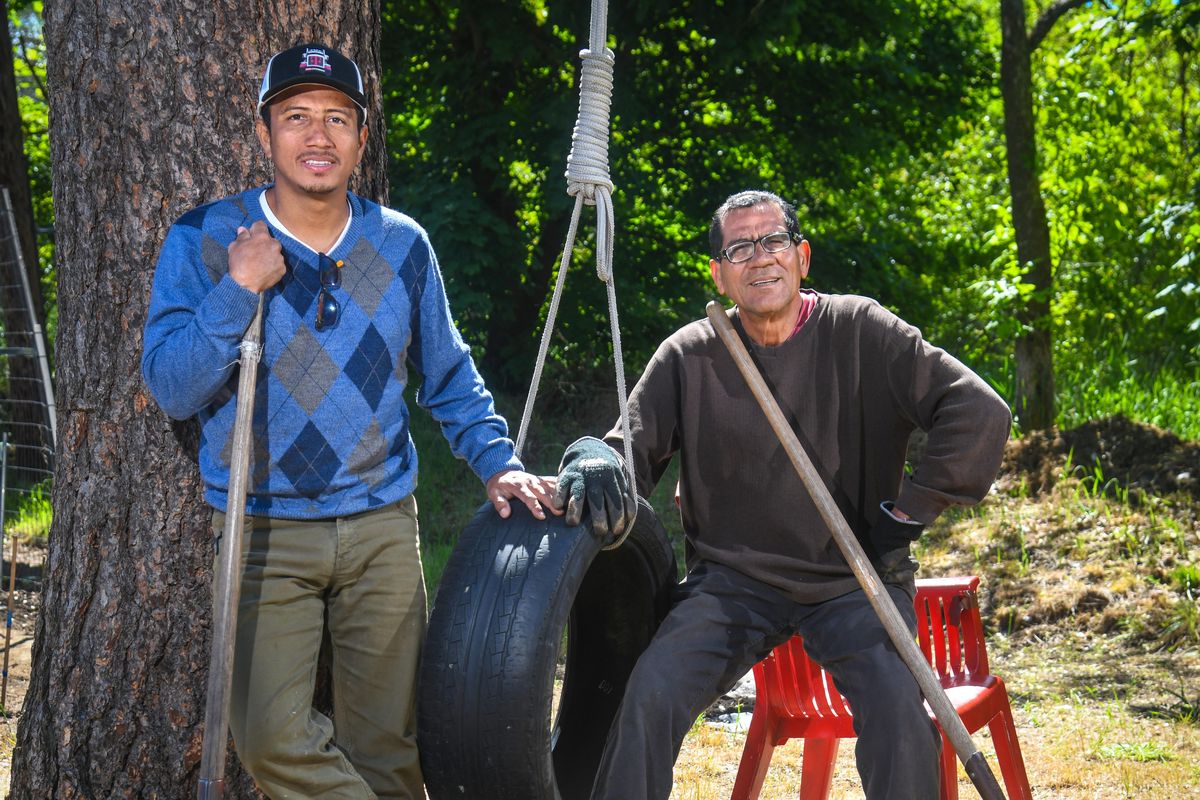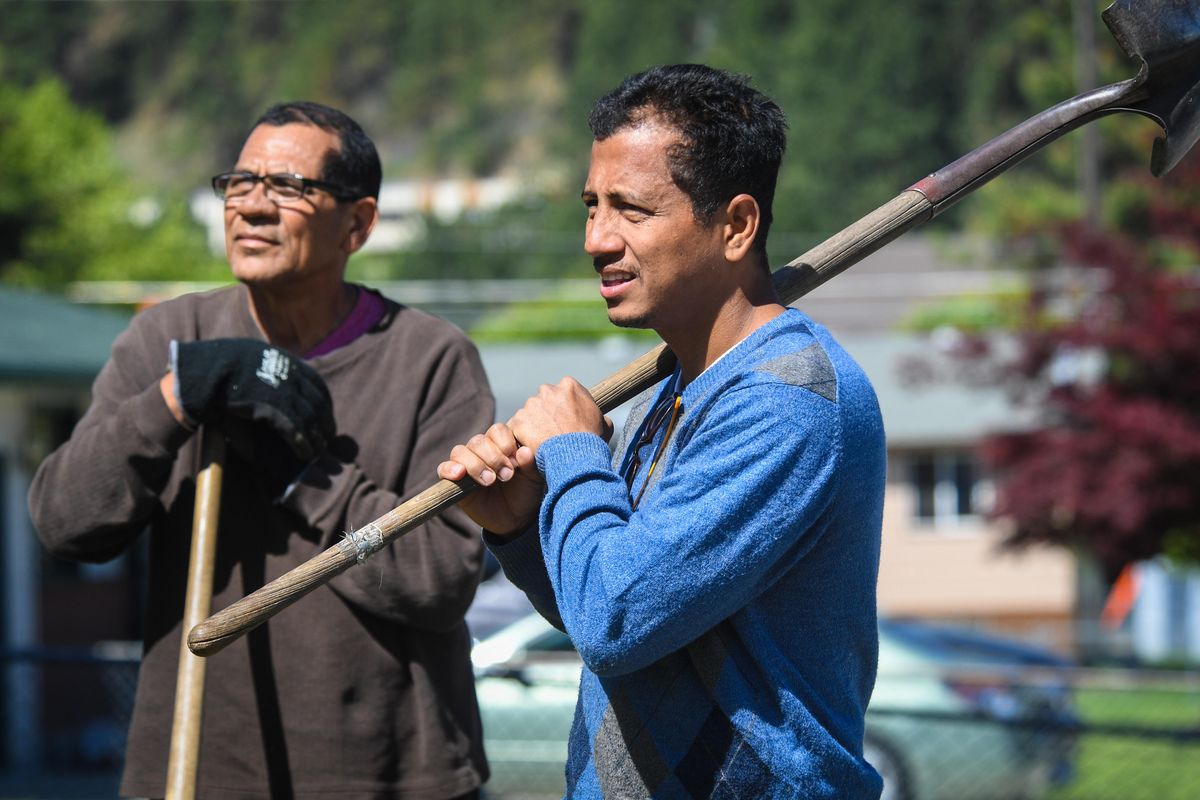‘I have a new family’: Nicaraguan refugee released to Spokane after 14 months in ICE detention
Nicaraugan refugee Silvio Urbina Rojas, 60, right, has been reunited with his nephew Alberto Lovo Rojas, 36, who spent 14 months in ICE detention. Alberto has been in Spokane for just over two weeks since his release due to a medical condition. He finished his quarantine on Sunday. The pair have been working to plant fruits and vegetables in their immigration sponsor’s yard. (Dan Pelle / The Spokesman-Review)Buy a print of this photo
The weeks that followed Alberto Lovo Rojas’ near deportation in early April were filled mostly with silence for his immigration sponsor in Spokane as she tried to follow the Nicaraguan refugee’s case.
Lovo Rojas’ uncle, Silvio Urbina Rojas, was in the process of being released to Spokane around that time, after more than a year in U.S. immigration detention in the southeast U.S. A heart condition led to his parole ahead of a review of his appealed asylum case.
Both men fled political violence in Nicaragua after Urbina Rojas was shot in the streets during a protest of the country’s Marxist president, Daniel Ortega, in May 2018. They feared they were being targeted because their neighbors looked to them for guidance as protest leaders.
“It was very hard to leave Nicaragua,” Lovo Rojas told The Spokesman-Review this week.
Both men arrived at the U.S.-Mexico border in January 2019 with optimism about the future. But they soon realized the harsh realities of the U.S. immigration system and how easy it would be to get lost in the shuffle, especially in the southeast, where few refugees are released on parole.
Despite the violence they endured, Lovo Rojas and Urbina Rojas lost their initial asylum cases.
Lovo Rojas’ two subsequent appeals also were denied, landing him at the Alexandria International Airport in Louisiana at the end of March.
He remembered the roll call of detainees slated to be deported on April 1 and the sounds of handcuffs clamping down around his ankles, waist and wrists.
In a last ditch effort to get attorneys to stop his deportation, he called a friend around 2 a.m.
He mulled over how he’d be able to see his young sons and girlfriend again but would almost certainly be captured by the Nicaraguan government upon his return.
“I was ready,” said Lovo Rojas, who likened the feeling to collapsing from exhaustion after losing a race.
Later that morning he watched Ecuadoran refugees load onto a plane destined for South America and take off.
Around 8 a.m. immigration officers began taking roll for the Nicaraguan refugees boarding their own deportation flight.
But no one called Lovo Rojas’ name.
When he asked if it was a mistake, Lovo Rojas told the officers about his appeal being refiled. And they said he should sit down because he’d be transferred to another immigration facility.
“Oooof,” said Lovo Rojas as he mimicked wiping sweat off of his forehead in relief.
Then came the news that he could be facing another year in immigration detention while his case was decided. He couldn’t imagine staying locked up that long, he said.
But during an interview with The Spokesman-Review, Urbina Rojas revealed to his sponsor, Suzi Hokonson, for the first time that his nephew had only one kidney due to a childhood car accident.
Hokonson called attorneys and advocates hoping they might use that information – if they didn’t already know about it – to fight for Lovo Rojas’ parole.
In the meantime, Lovo Rojas requested an appointment with a doctor four times before he received an exam to prove he had only one kidney.
He said that due to his condition he drinks large amounts of water and needs special medication when he is ill.
“High fever isn’t good for me,” said Lovo Rojas, noting his fear about contracting the novel coronavirus.
Ever since he was a teenager, Lovo Rojas remembers drinking his prescribed glass of water before breakfast each morning to help his kidney health.
He had to buy a bottle of water each day to continue that routine in immigration detention. And he never was able to find out whether the facilities he stayed at had the fever medication he needed if he was infected.
Lovo Rojas was finally called into the doctor’s office on May 1. He showed the scars he had from surgery, and more tests confirmed he was missing a kidney. He also relayed how afraid he was of what would happen if he contracted COVID-19.
Five days later, an immigration officer asked Lovo Rojas for Hokonson’s contact information.
And on May 8 – after more than 14 months in detention in eight facilities – he was released.
“I could not believe it,” Lovo Rojas said.
And, finally, the silence ended for Hokonson and Urbina Rojas.
They were in the car together when Lovo Rojas’ friend called to tell them he was being released, leading to hugs and tears of joy.
The private immigration facility Lovo Rojas was staying at, Catahoula Correctional Center, had at least eight confirmed cases of COVID-19 at the point, Lovo Rojas remembered.
As of Thursday, the facility had 60 positive detainees, according to ICE. Multiple detainees and guards have died from COVID-19.
Just last week a video of Urbina Rojas lying on the ground in May 2018 covered in blood from gunshot wounds surfaced on national news in Nicaragua. Another man held up handfuls of bullet casings from the ground for the camera to see.
Lovo Rojas remembers vividly the sound of automatic gunfire ringing out and how he turned to run for safety. He looked back to see his uncle lying on the ground with blood on his leg.
Bullets continued to whizz by Lovo Rojas’ head, and the gunfire that hit the pavement sparked along the ground.
Then, all of a sudden, the gunfire stopped, seemingly due to the work of an angel, Lovo Rojas said.
Light from street lamps reflected off of dozens of bullet casings across the ground.
One of the gunmen yelled out, “You’ll see, Lovo!”
Other demonstrators began distracting the gunmen, and a homeowner opened their doors for Urbina Rojas to hide inside. The first hospital he went to was too afraid of government retaliation to treat him.
Lovo Rojas believes the gunman who injured his uncle returned later but was unable to find them. He recalled the sound of a pistol being reloaded under the cover of darkness.
In the following days, Lovo Rojas’ house was painted red multiple times, marking him as an anti-government demonstrator. He removed the paint twice only for it to come back a third time, out of reach on the electric pole next to his home.
For four months he slept in different houses each night, until his hosts became fearful of retribution.
He also had nightmares of the violence he saw on May 30, 2018, when nearly 20 people died and more than 200 were injured by gunfire during a Mother’s Day protest in the nation’s capital. The demonstration was led by the mothers of those killed during previous protests.
Lovo Rojas stood just feet from a boy who was struck by a bullet in the head, likely from a sniper. He fell to the ground with part of his skull missing and another boy next to him was covered in blood.
“You explode in that moment,” Lovo Rojas explained, torn between grief, anger and fear.
Lovo Rojas said his wife tried to stop him from protesting, sometimes using his sons as leverage to stay safe. But he was strong in his conviction to stand up against Nicaragua’s authoritarian regime because he didn’t want his sons growing up under tyranny.
“It’s very easy to have opposite opinions,” Lovo Rojas said. “It’s not so easy to demonstrate.”
“You need to speak when the people lose their voice,” he said later. “The Nicaraguan people need to rise.”
Lovo Rojas and Urbina Rojas both say they believe U.S. immigration officials don’t understand the circumstances they faced, especially as they watched other, seemingly less deserving refugees released from detention.
“All you can do is share the story of what happened,” Lovo Rojas said.
When Hokonson opened the doors of the camper van Lovo Rojas would be quarantined in for two weeks after his release, she remembered he exclaimed, “I have not been in a bed since September 2018.”
He then dove into the covers and rolled around hugging a pillow.
Urbina Rojas and Lovo Rojas, who are unable to legally work for months, have poured their time and effort into working in Hokonson’s yard, planting fruits and vegetables.
“The two of them together, it’s like the same person,” Hokonson said of their bond.
Urbina Rojas said he looks at his nephew like a son.
“Now I have a new family,” Lovo Rojas said. “It’s a little empty in my heart for my family (in Nicaragua). I have hope one day my family can be here with me.”

